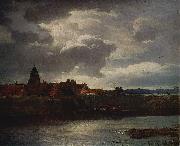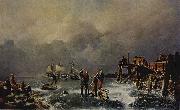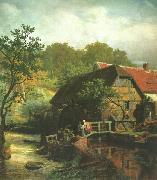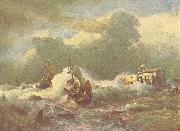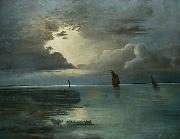Andreas Achenbach Olja Måleriet ReproduceringAll Andreas Achenbach Oil Paintings(September 29, 1815 - April 1, 1910) was a German landscape painter. Born at Kassel, he began his art education in 1827 in Desseldorf under Friedrich Wilhelm Schadow at the Desseldorf Academy of Painting. He studied at St Petersburg and travelled in Italy, Holland and Scandinavia.In his early work he followed the pseudo-idealism of the German romantic school, but on removing to Munich in 1835, the stronger influence of Louis Gurlitt turned his talent into new channels, and he became the founder of the German realistic school. Although his landscapes evince too much of his aim at picture-making and lack personal temperament, he is a master of technique, and is historically important as a reformer. The Chambers Biographical Dictionary says of him that "he was regarded as the father of 19th century German landscape painting." A number of his finest works are to be found at the Berlin National Gallery, the New Pinakothek in Munich, and the galleries at Dresden, Darmstadt, Cologne, Desseldorf, Leipzig and Hamburg. He died in Desseldorf. His brother, Oswald Achenbach (1827-1905), was also a painter. |
|||

|
|||
|
|
|||
|
||||||||
| Andreas Achenbach (September 29, 1815 - April 1, 1910) was a German landscape painter. Born at Kassel, he began his art education in 1827 in Desseldorf under Friedrich Wilhelm Schadow at the Desseldorf Academy of Painting. He studied at St Petersburg and travelled in Italy, Holland and Scandinavia.In his early work he followed the pseudo-idealism of the German romantic school, but on removing to Munich in 1835, the stronger influence of Louis Gurlitt turned his talent into new channels, and he became the founder of the German realistic school. Although his landscapes evince too much of his aim at picture-making and lack personal temperament, he is a master of technique, and is historically important as a reformer. The Chambers Biographical Dictionary says of him that "he was regarded as the father of 19th century German landscape painting." A number of his finest works are to be found at the Berlin National Gallery, the New Pinakothek in Munich, and the galleries at Dresden, Darmstadt, Cologne, Desseldorf, Leipzig and Hamburg. He died in Desseldorf. His brother, Oswald Achenbach (1827-1905), was also a painter. |
||||||||
|
|
||||||||
| Måleriet Identifieringen :: 80680 Landschaft mit Flub 1866 Medium Oil on canvas Dimensions 51 x 62,5 cm cyf |
||||||||
|
|
||||||||
| Måleriet Identifieringen :: 81894 Ufer des zugefrorenen Meeres 1839 Medium Oil on canvas Dimensions 138 x 225 cm (54.3 x 88.6 in) cyf |
||||||||
|
|
||||||||
| Måleriet Identifieringen :: 81931 Westfalische Wassermuhle 1863 Medium Oil on canvas cyf |
||||||||
|
|
||||||||
| Måleriet Identifieringen :: 82771 Leuchtturm bei Ostende 1887 Medium Oil on canvas Dimensions 123 x 224 cm (48.4 x 88.2 in) cyf |
||||||||
|
|
||||||||
| Måleriet Identifieringen :: 82826 Sonnenuntergang am Meer mit aufziehendem Gewitter 1903 Oil on canvas, 98 x 127 cm cyf |
||||||||
|
|
||||||||
| FÖREGÅENDE KONSTNÄR Nästa Konstnär | ||||||||
|
|
||||||||
|
Andreas Achenbach (September 29, 1815 - April 1, 1910) was a German landscape painter. Born at Kassel, he began his art education in 1827 in Desseldorf under Friedrich Wilhelm Schadow at the Desseldorf Academy of Painting. He studied at St Petersburg and travelled in Italy, Holland and Scandinavia.In his early work he followed the pseudo-idealism of the German romantic school, but on removing to Munich in 1835, the stronger influence of Louis Gurlitt turned his talent into new channels, and he became the founder of the German realistic school. Although his landscapes evince too much of his aim at picture-making and lack personal temperament, he is a master of technique, and is historically important as a reformer. The Chambers Biographical Dictionary says of him that "he was regarded as the father of 19th century German landscape painting." A number of his finest works are to be found at the Berlin National Gallery, the New Pinakothek in Munich, and the galleries at Dresden, Darmstadt, Cologne, Desseldorf, Leipzig and Hamburg. He died in Desseldorf. His brother, Oswald Achenbach (1827-1905), was also a painter. |
||||||||
|
|
||||||||
|
KOMMA I KONTAKT MED Oss |





